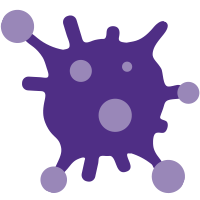
Immunology of Infectious Disease News
Immunology of Infectious Disease News is an online resource dedicated to covering the latest research and developments in the field of infectious diseases.
FGF7 Enhances the Expression of ACE2 in Human Islet Organoids Aggravating SARS-CoV-2 Infection
[Signal Transduction And Targeted Therapy] Researchers utilized islet organoids derived from human embryonic stem cells, animal models, and COVID-19 patients to discover that fibroblast growth factor 7 (FGF7) enhanced ACE2 expression within the islets, facilitating SARS-CoV-2 infection and resulting in impaired insulin secretion.
A Randomized Clinical Trial Investigating the Impact of Magnesium Supplementation on Clinical and Biochemical Measures in COVID-19 Patients
[Virology Journal] Scientists examined the impact of magnesium supplementation on clinical outcomes and biochemical factors among hospitalized patients with COVID-19.
Severity of COVID-19 Infection in Patients with COVID-19 Combined with Diabetes
[Journal Of Health Population And Nutrition] Investigators analyzed the correlation between blood glucose control and the severity of COVID-19 infection in patients with diabetes.
In Silico Design of a Novel Multi-Epitope Vaccine Against HCV Infection through Immunoinformatics Approaches
[International Journal Of Biological Macromolecules] An immunoinformatics method was applied to design a multi-epitope vaccine against the hepatitis C virus (HCV). The best B- and T-cell epitopes from conserved regions of the E2 protein of seven HCV genotypes were joined with the appropriate linkers to design a multi-epitope vaccine.
Ripretinib Inhibits HIV-1 Transcription Through Modulation of PI3K-AKT-mTOR
[Acta Pharmacologica Sinica] Researchers performed a high-throughput screening of FDA-approved compound library in the J-Lat A2 cell line to discover more efficacious latency-promoting agents. They discovered ripretinib being an LPA candidate, which was validated and observed to hinder proviral activation in cell models harboring latent infections, as well as CD4+ T cells derived from infected patients.
The Role and Impact of Viruses on Cancer Development
[Periodontology 2000] Investigators focus on three major aspects of oncoviruses' role in cancer development. They discuss geographic distribution, revealing that seven oncoviruses cause 20% of all human cancers worldwide.
Exploring the Association Between Erythema Multiforme and HIV Infection: Some Mechanisms and Implications
[Aids Research And Therapy] The authors highlight the potential direct and indirect role that HIV infection may play in the development of erythema multiforme and the clinical dilemma that arises in the management of HIV-infected patients with this condition.
WHO Clarifies What Counts as a Pathogen That Can Spread Through the Air
[CNN Health] The World Health Organization is opening up the definition of airborne pathogens – such as Covid-19, influenza and measles – to include when respiratory droplets spread through the air and when they land on a person, regardless of the size of the droplet.
Evasion of NKG2D-Mediated Cytotoxic Immunity by Sarbecoviruses
[Cell] Researchers found that SARS-CoV-2 evaded NKG2D recognition by surface downregulation of MIC-A/B via shedding, observed in human lung tissue and COVID-19 patient serum.
Interferon-Induced Transmembrane Protein-1 Competitively Blocks Ephrin Receptor A2-Mediated Epstein–Barr Virus Entry into Epithelial Cells
[Nature Microbiology] Scientists reported that interferon-induced transmembrane protein-1 (IFITM1) inhibited Ephrin receptor A2 (EphA2)-mediated Epstein–Barr virus (EBV) entry into epithelial cells (ECs). RNA-sequencing and clinical sample analysis showed reduced IFITM1 in EBV-positive ECs and a negative correlation between IFITM1 level and EBV copy number.
COVID-19 and Asthma Onset in Children
[Pediatrics] This retrospective cohort study examined children ages 1 to 16 within the Children’s Hospital of Philadelphia Care Network who received PCR testing for SARS-CoV-2 between March 1, 2020 and February 28, 2021.
HIV-1–Infected T Cell Clones Are Shared Across Cerebrospinal Fluid and Blood During ART
[JCI Insight] Researchers profiled people with HIV and uninfected controls through single-cell transcriptomic and T cell receptor sequencing to understand the dynamics of HIV persistence in the central nervous system.
Immunology of Infectious Disease News was founded to keep the scientific community current with the latest developments in infectious disease research. We feature high-impact publications, news, jobs, and events focused on immune responses to and the development of treatments for infectious diseases such as COVID-19, HIV, hepatitis, tuberculosis, influenza, and malaria.

 Cancer Stem Cell News
Cancer Stem Cell News Cell Therapy News
Cell Therapy News Dermal Cell News
Dermal Cell News Endothelial Cell News
Endothelial Cell News ESC & iPSC News
ESC & iPSC News Extracellular Matrix News
Extracellular Matrix News Hematopoiesis News
Hematopoiesis News Hepatic Cell News
Hepatic Cell News Human Immunology News
Human Immunology News Immune Regulation News
Immune Regulation News
 Intestinal Cell News
Intestinal Cell News Mammary Cell News
Mammary Cell News Mesenchymal Cell News
Mesenchymal Cell News Muscle Cell News
Muscle Cell News Neural Cell News
Neural Cell News Organoid News
Organoid News Pancreatic Cell News
Pancreatic Cell News Prostate Cell News
Prostate Cell News Pulmonary Cell News
Pulmonary Cell News
